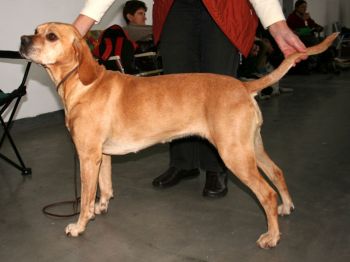
Portuguese Pointer
Veterinarian Reviewed on December 23, 2007 by Dr. Janice Huntingford
Physical Characteristics
Breed Group:
Gundogs.
Weight:
Females weigh approximately 16-22 kg and males weigh approximately 20-27 kg.
Height:
Approximately 48-60 cm at the withers.
Color(s):
Standard colourings are yellow or chestnut. These dogs can either be solid in colour or have white spots.
Coat:
The coat is a single layer of short, thick fur that lies close to the body.
Overview
Character:
Portuguese Pointers are lively and active dogs that work with enthusiasm. In addition to being multi-purpose hunters, these dogs are also very friendly and affectionate companions.
Country of Origin:
Portugal.
History:
While the origins of this breed remain unknown, the Portuguese Pointer is considered to be an indigenous Portuguese breed. These dogs have existed on the Iberian peninsula since at least the 1300’s but are still quite rare outside of Portugal.
Name:
Additional names for this breed include Perdigueiro Portugueso and Portuguese Pointing Dog.
Temperament:
Portuguese Pointers are tenacious and strong-willed dogs. Excellent trackers and retrievers, Portuguese Pointers have a very calm temperament.
Care
Training:
These enthusiastic dogs require firm training, but with the right handler they are relatively easy to train.
Activity:
Portuguese Pointers are very active and require plenty of daily exercise.
Ownership:
Portuguese Pointers are excellent as hunting dogs and as companion animals. Potential owners should keep in mind that these lively dogs require plenty of space and exercise. Portuguese Pointers require regular brushing to maintain the health and appearance of their coats and also require regular ear care.
Breeders
No breeders listed at this time.
Sign up for our newsletter and receive more articles and the latest pet health updates and special offers.
Our Expert
 Dr. Janice Huntingford
Dr. Janice HuntingfordJanice Huntingford, DVM, has been in veterinary practice for over 30 years and has founded two veterinary clinics since receiving her Doctor of Veterinary Medicine at the Ontario Veterinary College, University of Guelph. She has studied extensively in both conventional and holistic modalities. Ask Dr. Jan

